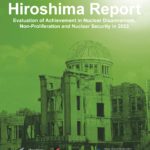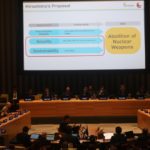(3) Treaty on the Prohibition of Nuclear Weapons (TPNW)
The number of countries which have signed and/or ratified the TPNW has steadily increased. As of the end of 2019, 34 countries have ratified (c.f., 19 countries in 2018) among the 80 signatories (69 countries in 2018). Austria, Kazakhstan,43 Mexico, New Zealand, South Africa and others have already ratified the treaty. Signatory countries include Brazil, Chile, Indonesia, the Philippines and Nigeria. The treaty enters into force after the fiftieth instrument of ratification, acceptance, approval or accession is deposited.
At the 2019 UNGA, a resolution was adopted titled “Treaty on the Prohibition of Nuclear Weapons,” which called for signing and ratifying the treaty.44 The voting behavior of countries surveyed in this project on this resolution is presented below.
➢ Proposing: Austria, Brazil, Chile, Indonesia, Kazakhstan, Mexico, New Zealand, Nigeria, Philippines, South Africa and others
➢ 123 in favor (Austria, Brazil, Chile, Egypt, Indonesia, Iran, Kazakhstan,
Mexico, New Zealand, Nigeria, Philippines, Saudi Arabia, South Africa, UAE and others), 41 against (Australia, Belgium, Canada, China, France, Germany, India, Israel, Japan, South Korea, Netherlands, Norway, Pakistan, Poland, Russia, Turkey, the United Kingdom, the United States and others), 16 abstentions (North Korea, Sweden, Switzerland and others) – Syria did not vote.
Proponents of the TPNW have emphasized its significance in moving toward the goal of a total elimination of nuclear weapons at the various fora in 2019, including the NPT PreCom and the First Committee of the UNGA. Co-sponsors of the 2018 UNGA resolution on TPNW (Austria, Brazil, Costa Rica, Ireland, Indonesia, Mexico, New Zealand, Nigeria, South Africa and Thailand) issued the “Joint Statement on TPNW” at the 2019 NPT PrepCom, in which they argued that the TPNW would strengthen the NPT, the International Atomic Energy Agency (IAEA) safeguards and the international nuclear non-proliferation and disarmament regime, and stated, “As such, this Treaty makes a concrete contribution to the overarching goal of the NPT.”45 Austria also said, “The TPNW provides a multilaterally agreed legal pathway in that direction, by accommodating the accession of nuclear weapon States, as soon as they are ready to commit to time-bound complete, verifiable and irreversible elimination of their nuclear weapons. The treaty therefore provides a logical and indispensable step to implement the NPT.”46 On the other hand, nuclear-armed states and their allies maintained their position not to sign the TPNW. In their joint statement submitted to the 2019 NPT PrepCom, the five NWS stated: “The P5 hold the view that the TPNW contradicts, and risks undermining the NPT, and reaffirmed their opposition to the TPNW”47 Among NWS, France harshly criticized the TPNW: “Those who have joined [the TPNW] must explain how to preserve security and stability, particularly in Europe and Asia, in the absence of nuclear deterrence, in the face of rearmament and the resurgence of threats, without risking high-scale conventional warfare.”48 At the 2019 PrepCom, Chair’s draft “Recommendations to the 2020 Review Conference” mentioned: “Acknowledge the support by many States parties for
the Treaty on the Prohibition of Nuclear Weapons and its complementarity to the NPT.”49 However, the recommendations were not adopted due to opposition from NWS and other parties. Among countries which supported the establishment of the TPNW at the 2017 negotiating conference, Sweden published a report prepared by an investigator appointed by the government in January 2019. The report stated: “[I]t does not reaffirm in a clear and binding way the importance of the NPT, the Additional Protocol and the CTBT…[and the] Treaty provisions would also put Sweden in a potentially difficult situation should the issue of withdrawal arise…[Therefore, the] overall assessment of the implications for Sweden as regards the three main clusters of questions in the terms of reference leads to the conclusion that Sweden should neither accede to nor sign the Treaty in its present form.”50 After further discussions, Sweden announced in July that it would not sign the TPNW for the time being.51 In April, Switzerland also announced that it would postpone a decision on signing the TPNW until 2020, rejecting calls from Parliament to sign it, and said: ”By the end of 2020, it will carry out a new analysis of the situation. This reflection time will be used to take stock of the latest developments in international politics and security.”52
Regarding a legal prohibition of nuclear weapons, the UNGA in 2019 adopted resolutions “Follow-up to the advisory opinion of the International Court of Justice on the legality of the threat or use of nuclear weapons”53 and “Convention on the prohibition of the use of nuclear weapons.”54 Their respective voting behaviors are as follows.
➢ “Follow-up to the advisory opinion of the International Court of Justice on the legality of the threat or use of nuclear weapons”
Proposing: Egypt, Philippines and others
138 in favor (Austria, Brazil, Chile, China, Egypt, Indonesia, Iran, Kazakhstan, Mexico, New Zealand, Nigeria, Pakistan, Philippines, Saudi Arabia, South Africa, Sweden, Switzerland, Syria, UAE and others), 33 against (Australia, Belgium, France, Germany, Israel, South Korea, Netherlands,Norway, Poland, Russia, Turkey, the United Kingdom, the United States and others), 15 abstentions (Canada, North Korea, India, Japan and others)
➢ “Convention on the prohibition of the use of nuclear weapons”
Proposing: India and others
118 in favor (Chile, China, Egypt, India, Indonesia, Iran, Kazakhstan, Mexico, Nigeria, Saudi Arabia, South Africa, Syria, UAE and others), 50 against (Australia, Austria, Belgium, Canada, France, Germany, Israel, South Korea, Netherlands, New Zealand, Norway, Poland, Sweden, Switzerland, Turkey, the United Kingdom, the United States and others), 15 abstentions (Brazil, Japan, North Korea, Pakistan, Philippines, Russia and others)
Iran proposed at the 2019 NPT PrepCom to “[establish] an ad hoc committee within the 2020 Review Conference to work on the illegality of the use and threat of use of nuclear weapons under all circumstances.”55
43 Russia has conducted inter-continental ballistic missile (ICBM) flight tests at a missile test site in Kazakhstan. The most recent one was conducted in November 2019. It is pointed out that Kazakhstan’s activity would constitute a violation of “assistance” on nuclear weapons under the TPNW. Ulrich Kühn, “Kazakhstan—Once More a Testing Ground?” Valdai Club, July 12, 2019, https://carnegieendow ment.org/2019/07/12/kazakhstan-once-more-testing-ground-pub-79510.
44 A/RES/74/41, December 12, 2019.
45 “Joint Statement on the Treaty on the Prohibition of Nuclear Weapons (TPNW),” 2019 NPT PrepCom, May 2, 2019, http://reachingcriticalwill.org/images/documents/Disarmament-fora/npt/prepcom19/ statements/2May_Austria_Group.pdf.
46 “Statement by Austria,” Cluster 1, 2019 NPT PrepCom, May 2, 2019. See also a working paper submitted by Austria and Mexico (NPT/CONF.2020/PC.III/WP.46, May 1, 2019).
47 “Statement by China, on Behalf of the P5 States,” General Debate, 2019 NPT PrepCom, May 1, 2019.
48 “Statement by France,” Cluster 1, 2019 NPT PrepCom, May 2, 2019.
49 NPT/CONF.2020/PC.III/CRP.4/Rev.1, May 9, 2019.
50 “Inquiry into the Consequences of a Swedish Accession to the Treaty on the Prohibition of Nuclear Weapons,” January 2019, https://www.regeringen.se/48f047/contentassets/55e89d0a4d8c4768a0cabf4c 3314aab3/rapport_l-e_lundin_webb.pdf.
51 Jan M. Olsen, “Sweden Says It Won’t Sign UN Nuclear Ban Treaty,” Associated Press, July 12, 2019, https://apnews.com/40a5b0e8d19d415f942786b0c8d647d7. Foreign Minister Margot Wallstrom said the text has “no clear definition of nuclear weapons and there are a number of issues that must be answered.” She also told that Sweden would seek to become an observer state once the treaty enters into force. “Statement by Sweden,” General Debate, First Committee, UNGA, October 14, 2019.
52 “Switzerland Postpones Decision on Nuclear Weapons Treaty,” Xinhua, April 4, 2019, http://www. china.org.cn/world/Off_the_Wire/2019-04/04/content_74644259.htm.
53 A/RES/74/59, December 12, 2019.
54 A/RES/74/68, December 12, 2019.
55 NPT/CONF.2020/PC.III/WP8, March 20, 2019







